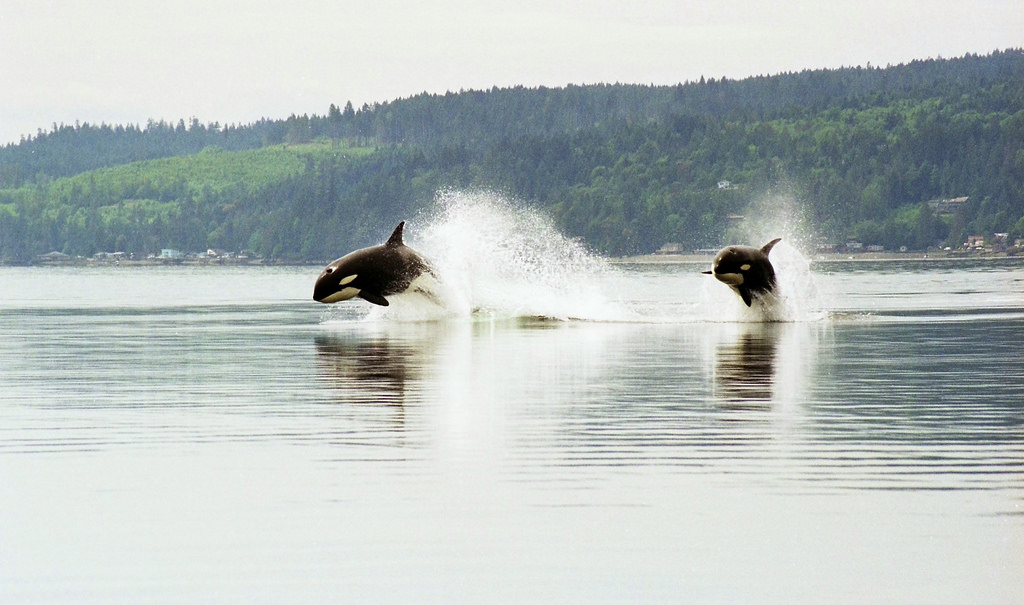Climate change fuels accumulation of pollutants in Chinook salmon, killer whales
September 11, 2018

September 11, 2018

University of British Columbia researchers studying the marine food web of the Northeast Pacific Ocean have found that the exposure and accumulation of chemical pollutants, such as polychlorinated biphenyls (PCBs) and organic mercury, will be exacerbated under climate change.
The study, published recently in Scientific Reports, also found that this would increase the accumulation and risk of exposure to these pollutants and their toxic health effects, on both mid-level predators like Chinook salmon as well as top predators like resident killer whales.
“This has serious implications,” said lead author Juan José Alava, a researcher at the UBC Institute for the Oceans and Fisheries’ OceanCanada Partnership and Nippon Foundation-UBC Nereus Program. “All of the southern resident killer whales that exist along the Pacific Northeast Coast eat Chinook salmon, which is their primary diet. These iconic whales are already facing many anthropogenic impacts—ship traffic, underwater noise, marine pollution—and they will be further impacted by increased pollutant bioaccumulation driven by climate change.”
Researchers focused the study on the Northeast Pacific marine ecosystems such as the Strait of Georgia, offshore waters of Haida Gwaii, the west coast of Vancouver Island and Puget Sound. They found that, for killer whales, concentrations of organic mercury are projected to increase by eight per cent and PCBs by three per cent in a “business as usual” or high CO2 emission scenario. However, in a low emission scenario where CO2 levels are strongly reduced, concentrations of organic mercury are projected to increase by one per cent and PCBs by less than one per cent. Worse, for Chinook salmon, the levels of pollutants are projected to be almost 10 per cent higher for both organic mercury and PCBs than levels for killer whales.
Alava noted that in recent years the Pacific Coast has seen a decline in the Chinook salmon population, likely due to the impact of ocean warming. Now this species of salmon will also likely be impacted by increased pollutants in their food web, magnified under climate change, the study has found.
“Our marine ecosystems are threatened by multiple global and local stressors, including climate change and pollution, from human activities acting simultaneously and interactively,” said co-author William Cheung, associate professor in the Institute for the Oceans and Fisheries, director of science at the Nippon Foundation-UBC Nereus Program, and a principal investigator of the OceanCanada Partnership at UBC. “Our study suggests that reducing pollution have the co-benefits of lower the threats of climate change to vulnerable animals such as salmon and killer whales.”
“This study underscores the urgent need for contaminant management and control and potential pollution mitigation policies including, limiting and preventing mercury and greenhouse gas emissions from human activities and fossil fuel and coal burning. This is of paramount importance as Canada has yet to accomplish the mitigation and reduction of CO2 levels committed at the Paris Agreement,” said Alava.
Funding for this study was provided by the Mitacs-SSHRC joint initiative, OceanCanadaPartnership and Ocean Pollution Research Program, Coastal Ocean Research Institute (Ocean Wise/Vancouver Aquarium Marine Science Centre), as well as the Nippon Foundation-UBC Nereus Program.
We honour xwməθkwəy̓ əm (Musqueam) on whose ancestral, unceded territory UBC Vancouver is situated. UBC Science is committed to building meaningful relationships with Indigenous peoples so we can advance Reconciliation and ensure traditional ways of knowing enrich our teaching and research.
Learn more: Musqueam First Nation